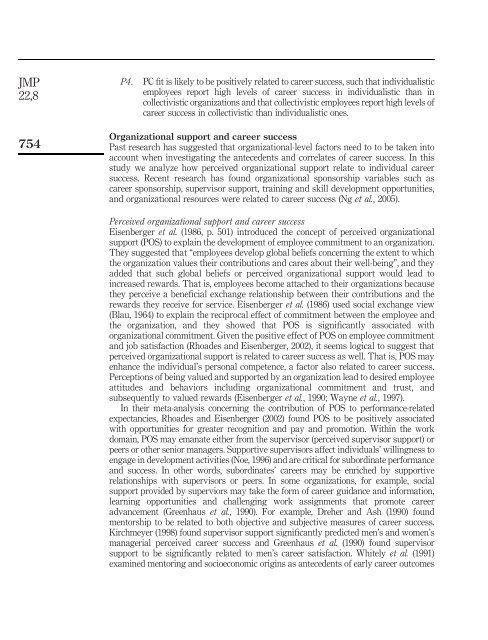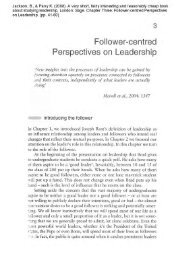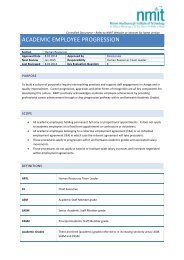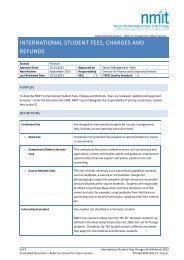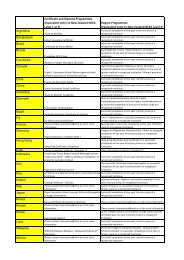JMP22,8754P4. PC fit is likely to be positively related to career <strong>success</strong>, such that individualisticemployees report high levels of career <strong>success</strong> in individualistic than incollectivistic organizations and that collectivistic employees report high levels ofcareer <strong>success</strong> in collectivistic than individualistic ones.Organizational support and career <strong>success</strong>Past research has suggested that organizational-level factors need to to be taken intoaccount when investigating the antecedents and correlates of career <strong>success</strong>. In thisstudy we analyze how perceived organizational support relate to individual career<strong>success</strong>. Recent research has found organizational sponsorship variables such ascareer sponsorship, supervisor support, training and skill development opportunities,and organizational resources were related to career <strong>success</strong> (Ng et al., 2005).Perceived organizational support and career <strong>success</strong>Eisenberger et al. (1986, p. 501) introduced the concept of perceived organizationalsupport (POS) to explain the development of employee commitment to an organization.They suggested that “employees develop global beliefs concerning the extent to whichthe organization values their contributions and cares about their well-being”, and theyadded that such global beliefs or perceived organizational support would lead toincreased rewards. That is, employees become attached to their organizations becausethey perceive a beneficial exchange relationship between their contributions and therewards they receive for service. Eisenberger et al. (1986) used social exchange view(Blau, 1964) to explain the reciprocal effect of commitment between the employee andthe organization, and they showed that POS is significantly associated withorganizational commitment. Given the positive effect of POS on employee commitmentand job satisfaction (Rhoades and Eisenberger, 2002), it seems logical to suggest thatperceived organizational support is related to career <strong>success</strong> as well. That is, POS mayenhance the individual’s personal competence, a factor also related to career <strong>success</strong>.Perceptions of being valued and supported by an organization lead to desired employeeattitudes and behaviors including organizational commitment and trust, andsubsequently to valued rewards (Eisenberger et al., 1990; Wayne et al., 1997).In their meta-analysis concerning the contribution of POS to performance-relatedexpectancies, Rhoades and Eisenberger (2002) found POS to be positively associatedwith opportunities for greater recognition and pay and promotion. Within the workdomain, POS may emanate either from the supervisor (perceived supervisor support) orpeers or other senior managers. Supportive supervisors affect individuals’ willingness toengage in development activities (Noe, 1996) and are critical for subordinate performanceand <strong>success</strong>. In other words, subordinates’ careers may be enriched by supportiverelationships with supervisors or peers. In some organizations, for example, socialsupport provided by superviors may take the form of career guidance and information,learning opportunities and challenging work assignments that promote careeradvancement (Greenhaus et al., 1990). For example, Dreher and Ash (1990) foundmentorship to be related to both objective and subjective measures of career <strong>success</strong>.Kirchmeyer (1998) found supervisor support significantly predicted men’s and women’smanagerial perceived career <strong>success</strong> and Greenhaus et al. (1990) found supervisorsupport to be significantly related to men’s career satisfaction. Whitely et al. (1991)examined mentoring and socioeconomic origins as antecedents of early career outcomes
for salaried managers and professional graduates working in various organizations.They found career mentoring to be related to career <strong>success</strong>. Other researchers foundthat mentorship and supportive work relationships were related to career advancementas well as perceived career <strong>success</strong> (Turban and Dougherty, 1994). Wallace (2001) foundthat mentoring for female lawyers increased their career <strong>success</strong> and satisfaction. Allenet al. (2004) reviewed empirical studies concerning the career benefits associated withmentoring and concluded that career mentoring is more strongly related to subjectiveindicators of career <strong>success</strong> than it is to objective career <strong>success</strong> indicators. Nabi (2001)suggested social support to fall into three categories: personal, peer, and network. Hefound peer support (support and guidance provided by experienced peer) to be stronglyrelated to men’s subjective career <strong>success</strong>, whereas personal support (support andenhancing information from friends or career-related issues) to be strongly related towomen’s subjective career <strong>success</strong>. Recent research relates social capital to careermobility and outcomes (Lin and Huang, 2005). Seibert et al. (2001) found that socialcapital was positively related to promotions and career satisfaction and Burt (1997)reported that managers with more social capital, measured by network constraints, werepromoted faster and received larger bonuses than those with less social capital (networkscomposed of few contacts). Hence, we propose that perceived social support at work inthe form of mentorship, netwoking and supportive work relationships would lead togreater career opportunities and enhanced career satisfaction.P5. There will be a positive relationship between perceived organizationalsupport and career <strong>success</strong>. Employees who perceive high levels oforganizational support will report greater career <strong>success</strong> than employeeswho percive low levels of support.<strong>Career</strong> <strong>success</strong>755Limitations and future research suggestionsThis study was limited by the set of factors that were proposed to be linked to career<strong>success</strong>. Although there are many predictors that have been examined in previous modelsof career <strong>success</strong>, the study was just a literature review and explored the impact ofperson-job fit, person-organization fit, and person-culture fit on career <strong>success</strong>. There hasbeen little research effort to identify what are the different types of PE fit that are mostrelated to components of career <strong>success</strong> and whether the effect is direct or indirect.Consequently, one area of future research concerns the influence of various levels of PE fiton career <strong>success</strong>. Kristof-Brown et al. (2005) found that employees’ work attitudes weredifferentially predicted by different forms of PE fit. While this study utilized three types ofPE fit porposed to influence career decisions, these need to be empirically tested alongand/or with other forms. Future research is needed to expand the various levels of PE fit(person-group, person-department, person-supervisor, person-team) for a more completeunderstanding of the proposed relationships between levels of PE fit and components ofcareer <strong>success</strong>. For example, there may be individual differences that predict the extent towhich employees (and perhaps organizations) place value on fit with the supervisor, fitwith one’s workgroup, or fit with one’s team, and these differences might be important forexplaining variation in career <strong>success</strong>.In this study I have attempted to address the question: how does PE fit relate tocomponents of career <strong>success</strong>? Because individuals may perceive and assess careerbenefits and outcomes <strong>success</strong> according to their perceived and/or actual fit withspecific work environment within the context of employment relationships, it is useful
- Page 5: the contract is a contract with one
- Page 8: JMP22,8748Bauer, 2005). Werbel and
- Page 12 and 13: JMP22,8752supervisors) in their wor
- Page 16 and 17: JMP22,8756to investigate the effect
- Page 18 and 19: JMP22,8758To conclude, career succe
- Page 20 and 21: JMP22,8760Crant, J.M. (1995), “Th
- Page 22 and 23: JMP22,8762Lin, S. and Huang, Y. (20
- Page 24: JMP22,8764Seibert, S.E., Crant, J.M


